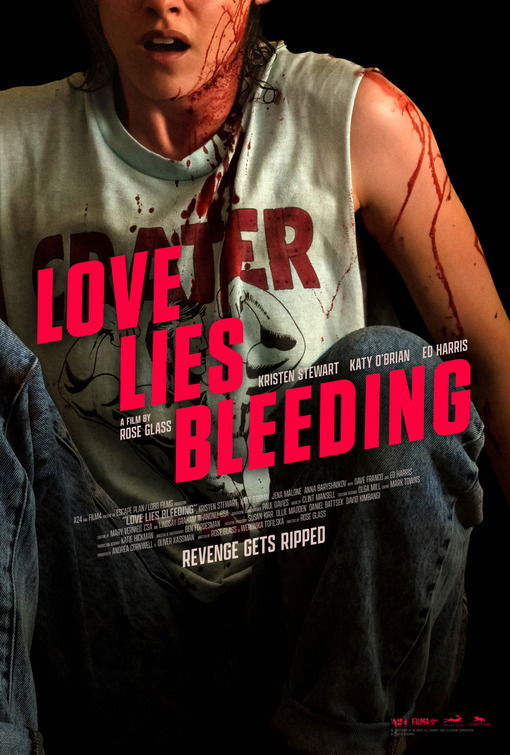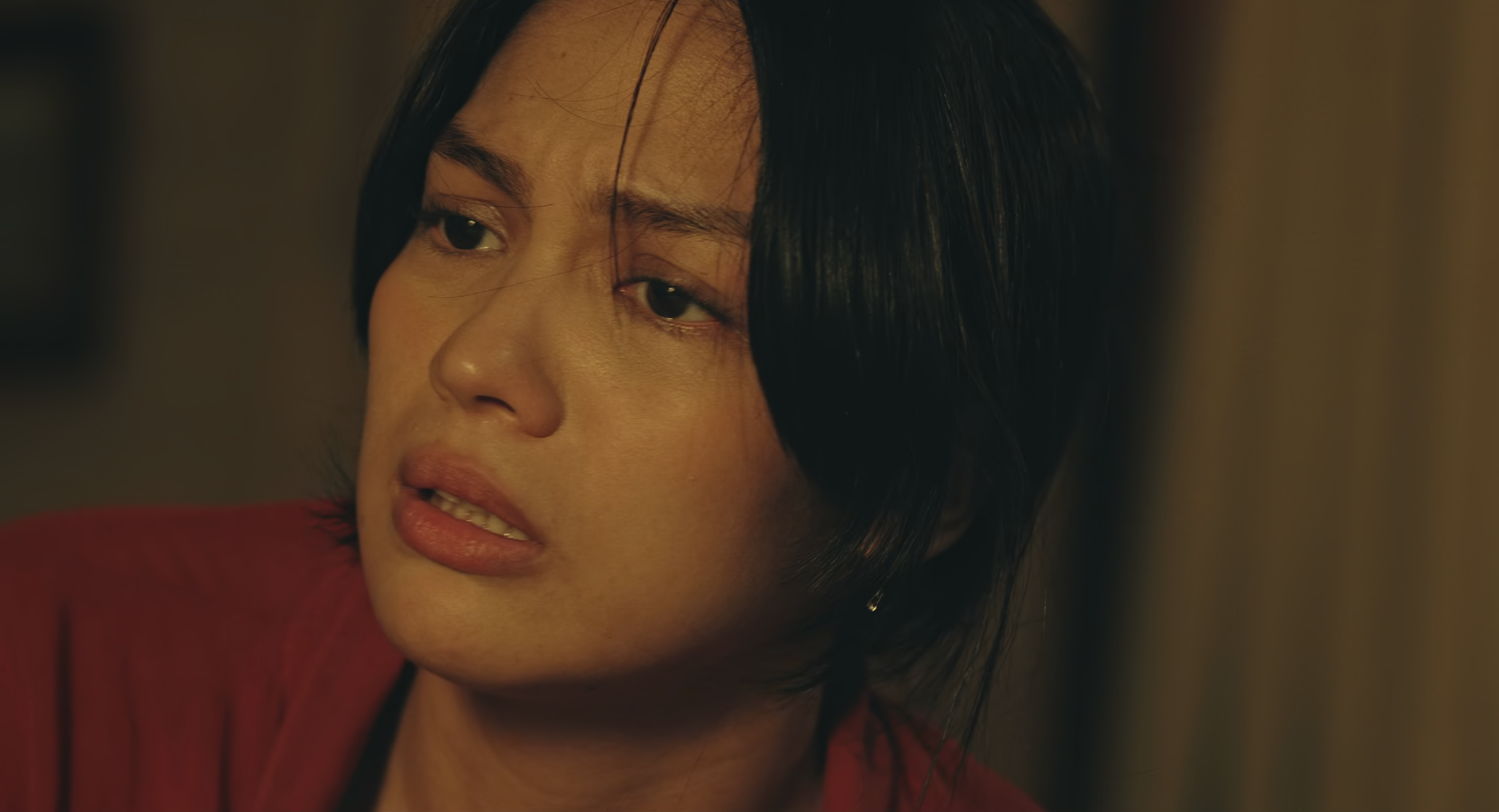Movie Reviews
Film Review: I Saw The TV Glow (2024) – Soundsphere magazine

How we watch television in 2024 has changed radically since this intrepid writer was a wee lad. Back when we were kids, with the internet and streaming a thing of rumour and something out of the 70s dystopian sci-fi film that would lead to the rise of machines and the demise of the human race (which might still happen, of course), we had to make sure we carved out the time to see the show we wanted because then it would disappear. No repeats, no catch-up, no YouTube. Consumption and consumerism have become different beasts in the decades since and, in their sophomore feature, Jane Schoenbrun dissects our relationships with the box with the big glow, just one of the many narratives flowing through this intoxicating new film.
1996: Owen (Justice Smith and Ian Foreman) is a young teenager in a Clinton-era America struggling to find his place in life, school, and his general surroundings, feeling conflicted about his relationships with other people, his mother, and his sexuality. At a teacher/parent conference-style evening, he meets Maddy (Brigette Lundy-Paine, stunning) who, to Owen, is a much more together person than himself, exuding cool aloof, and confident. Maddy confides that she likes girls, whereas Owen states he likes TV shows, and soon enough she recommends he watch her favourite television show, The Pink Opaque, which may help him through some tough times as it did her: part Buffy the Vampire Slayer, part David Lynch nightmare, the two lead characters may hold some answers for them, both in this world and in the world of the show.
For anyone coming into this one cold, make sure it stays that way but one way to prep yourself is to devour Schoenbrun’s debut feature We’re All Going To The World’s Fair. Released in 2022 at the height of the pandemic after its Sundance debut a year earlier, it showcased the writer/director’s unique prowess as a filmmaker and immediately put them on the map in a big way. A coming-of-age narrative is never the most challenging of genres to tap into but under their visual intensity and knack for the visceral and the challenging, it made the usual cliches feel new and fresh as it delved into internet culture, fan forums, and how we can get lost in new worlds that replace our own. With Glow, they set their sights on our consumption of television and our over-reliance on them for escapism and, by extension, being seen.
The characters of the show-within-the-show may be fake but for Owen and Maddy they allow them to feel comfort, to feel seen, and to feel the love and affection their real world hasn’t provided: whether it’s part of a family dynamic or their own curiosities and sexuality, it allows them safety and guidance where those around them haven’t been able to. Indeed, it delves deep into our fascination as humans with the old gogglebox and how much we rely on it to service our everyday needs and affections, even if it means missing everything going on around us – heck, we even observe people in social experiments, people dancing on TikTok and watch other people watch the television in some bizarre Truman Show-esque nightmare that only gets more and more compelling.
With panache, colour, and dense, intriguing texture, Schoenbrun’s exhilarating filmmaking is to be admired and applauded, taking us on original adventures through old pastures and making us look, think and feel everything very differently, even if a few notes don’t quite hit the heights of the rest of them. It will polarise audiences, for sure, but in a cinema landscape that is becoming increasingly more predictable, their voice is one to be shouted about through the flatscreens.
![]()

Movie Reviews
Movie Review: Millennials try to buy-in or opt-out of the “American Meltdown”

“American Meltdown” is a comic buddy picture that taps into the deep well of Millennial angst and grievance about a “system” that is finally so broken it doesn’t work for them. At all.
Like a lot of fiction and op ed essays about the large and maligned generation, it’s very much in the eye of the viewer — this perception that these mid-20s to late30somethings are either the first to figure out American capitalism, culture and politics is “rigged,” or simply the first to considering giving up trying to fix it.
It’s an indie film that reminds us there’s talent out there that mainstream distributors haven’t embraced — in front of and behind the camera. And fittingly enough for the subject generation, “Meltdown” feels self-satisfied but incomplete, with a finale that plays like a pulled-punch.
Jacki Von Preysing makes her feature film debut as Olivia, an interior designer who learns she needs to take “90 days off” so that her scummy “blame the unions” (there are none) employer (Bella Shaw) can avoid paying her “full time” wages, with benefits, and on the same day comes home to see that her SoCal rental house has just been ransacked.
Broke, blamed for the break-in by the lazy, dismissive Millennial cop (Shaun Boylan) and her creeper corporate landlord (Clayton Farris), in a house she can’t afford since her inheritance baby beau (Christopher Mychael Watson) ditched her for “an influencer,” on a “background check” waitlist for a job driving for one of those predatory rideshare services, Olivia’s delusions of The American Dream are tattered.
She stumbles into this photographer under a pier on the beach, who snaps a picture that makes her look like someone’s who’s died, or just given up. Then shutterbug Marí (Nicolette Sweeney) chases Olivia down and returns the wallet “you dropped.” As it’s not the right wallet, and the right one and the wrong one, both in Marí’s possession, are empty of cash, Olivia needs to look past “super sketchy” apologies and see the pickpocket for who she really is.
Unlike Olivia, Marí has dropped off the capitalism hamster-wheel, living hand-to-mouth, off-the-grid and in a van in the desert. When she’s in town, prowling this or that beach or street scene, she “only” steals “from those who deserve it.”
As the cop IDs Olivia as “Bougie,” we understand Marí’s mistake. She thought Olivia had money and takes pity on her when she realizes otherwise. And “sketchy” or not, Olivia could use a little company right now — for binge drinking, and for companionship in the tony and now scary house Olivia is afraid to sleep in alone.
An unlikely friendship drifts towards “partnership” as the movie hints at a big crime to come. Olivia is interviewed by a detective (DeMorge Brown) in the aftermath of that event, viewed in flashbacks as the script reconstructs the nature of Olivia and Marí’s relationship.
Olivia is passive. Marí seeks revenge or some form of rough justice. Olivia despairs at her plight — calmly.
“What’s the use of being calm,” Marí’ wants to know” “ANGRY people get s–t done!”
The leads and supporting players are make believable characters out of one and all. But writer-director Andrew Adams leaves out connecting scenes that would make the abrupt shifts of setting and attitude less jarring.
Expressions of generational angst and rage register. But while some seem rational and justified, others come off as “Ok Boomer” cant from folks who deserve at least some of the “entitled,” impatient and (intellectually and physically) “lazy” labeling and abuse tossed at them by their elders.
No matter where your birthday falls on the generational dividing line, “American Meltdown” never quite shakes the “letdown” it seems destined to become.
Sharper contrasts in the character’s arcs were called for, maybe a few pickpocket and anarchist politics lessons from the van-dweller jarring Ms. Buys-in into questioning her faith in a system that either denies her dreams, or is to blame for her having those dreams in the first place.
Whatever its failings, “American Meltdown” should inspire others to tackle this subject at this point in time. Because as bad as things might seem to Millennials and those coming up after them, something tells the rest of us that these will soon be the “good old days” for those who don’t consciously work, shop, vote and fight to change the future they so despair of facing.

Rating: TV-16+ (profanity)
Cast: Jacki Von Preysing, Nicolette Sweeney, Shaun Boylan, Clayton Farris, DeMorge Brown and Bella Shaw.
Credits: Scripted and directed by Andrew Adams. An MPX release on Amazon Prime.
Running time: 1:22
Movie Reviews
LOVE LIES BLEEDING Review

LOVE LIES BLEEDING is a modern-day, highly immoral, sleazy take on the film noir genre. It features a graphic lesbian relationship, numerous scenes of graphic violence, substance abuse, and abundant foul language. The movie has a twist-filled script, fast pacing and gritty performances, but it repulsed the vast majority of moviegoers at the box office.
Dominant Worldview and Other Worldview Content/Elements:
Vicious, promiscuous, totally immoral movie filled with violence and sex, especially lesbian sex;
Foul Language:
At least 78 obscenities (including 65 “f” words), three strong profanities using Jesus Christ and a gross scene where a woman has to unclog a clogged toilet;
Violence:
Numerous people are shot in graphically bloody fashion with sickening wounds and shocking sound effects, woman shoots another woman in the head and causes blood to splatter all over the camera, woman beats a man to death, woman breaks that man’s jawbone wide open as she slams his head repeatedly into a table, abused wife is hospitalized by a particularly brutal yet offscreen beating that leaves her face severely bruised and swollen, another character tortures this woman by pressing hard against her facial injuries, woman shoots another man in a shootout then shoves the barrel of her gun into his mouth, takes the gun back out but smashes the gun into his face to kill him, and a woman is shown waking up from a seemingly fatal gunshot wound, but another woman chokes her to death and dumps her body in the desert;
Sex:
Graphic lesbian sex scenes, particularly showing oral sex, the sex is shown promiscuously on a one-night stand, and later another lesbian blackmails one of the lead lesbians into having relations with her (though this is only implied and discussed, not shown), movie opens with a man having forceful, adulterous sex with a woman from behind in the back of a car, and a lesbian sucks on her girlfriend’s toe;
Nudity:
Several lesbian sex scenes feature female breasts and buttocks but no genitals, another lesbian woman is shown standing with full rear nudity after an implied sex scene, and shirtless men are seen working out in several scenes;
Alcohol Use:
Adults frequently drink alcohol, with one scene showing a woman drunk;
Smoking and/or Drug Use and Abuse:
A woman smokes cigarettes frequently, a female bodybuilder severely abuses steroids throughout, leading to violent outbursts and her vomiting onstage in front of a crowd, and the steroid injections are shown in a sensuous fashion;
Miscellaneous Immorality:
Lying, double-crosses, deception rampant throughout, with a dehumanizing use of violence.
LOVE LIES BLEEDING is a modern-day, highly immoral, sleazy take on the film noir genre that centers on a graphic lesbian relationship, numerous scenes of graphic violence and an abundance of foul language. LOVE LIES BLEEDING has a twist-filled script, fast pacing and gritty performances, but should not be viewed by anyone.
The story centers upon a lesbian woman named Lou (Kristen Stewart), who is estranged from her vicious father Lou Sr. (Ed Harris) yet works managing a decrepit gym he owns in their desert town. Meanwhile, a female drifter named Jackie (Katy O’Brien) arrives in town and immediately engages in back-seat, adulterous sex with JJ (Dave Franco), who’s married to Lou’s sister Beth (Jena Malone).
The backseat liaison results in a job for Jackie at a gun range on the edge of town owned by Lou Jr. She’s just saving up money to finish a trip to Las Vegas for a women’s bodybuilding championship, and when she flexes her massive muscles, Lou is instantly attracted to her.
The two soon engage in a tawdry sexual relationship, but Lou’s happiness is abruptly halted when Beth winds up in a hospital after a vicious (offscreen) beating at the hands of JJ. Lou Sr. wants to keep it all in the family rather than report JJ to the police, which angers Lou greatly.
Jackie has been abusing steroids in order to build muscle for her upcoming competition, and flies into a murderous rage that results in her brutally killing JJ. When Lou and Jackie dump his body in an enormous pit in the desert outside of town, a string of double-crosses explodes as Lou Sr. is determined to find out who killed JJ and federal agents start asking Lou lots of questions about his potentially criminal enterprises.
Can Lou manage to bring her father and his illicit crime machine down? Is Jackie a serious love interest or a con artist using her for her own ends?
LOVE LIES BLEEDING has excellent performances from all of its cast, who bring a wide array of seedy characters to vivid life. Also, Director/Co-writer Rose Glass keeps the twists coming fast and furious throughout the movie’s bonkers second half.
Despite the technical skill with which it’s made, LOVE LIES BLEEDING is a movie that has literally no characters to support and no sense of legal justice – just brutal vigilante revenge meted out several times over. Even Lou becomes utterly reprehensible and heartless by the end, and the movie’s entire mood is demoralizing and dehumanizing.
Packed with graphic violence, sex and nudity and an abundance of foul language, LOVE LIES BLEEDING is utterly distasteful and a must to avoid for viewers of all ages.
Movie Reviews
Love Child (2024) Movie Review & Ending Explained: Can Love and Sacrifice Keep Ayla and Paolo’s Family Together?

Rom Coms, the ones that match the endearing and intelligent with equal fluency, have a scintillating flavor. The book of tricks to make a romcom sing and soar may have admittedly gone jaded and dog-eared. The crises of couples, dilemmas, and anxieties they have to battle have undergone dramatic changes in a fast-evolving world. Expectations vary with the decades, even as gendered rules haven’t dented much.
The urge to steal a leaf or two from every standard template Hollywood romcom is immanent in any new derivation. It becomes a constant tussle, hence, for a new film in similar spaces to eke out freshness and smarts. Jonathan Jurilla’s directorial “Love Child” (2024) has little to add or say anything genuinely sparkling. It’s a weary distillation of parental exhaustion and re-alignment, too silly to pass off what it views as clever self-reflexive remarks.
There are basic cardinal rules a romcom must ensure is upheld. Conflicts should ideally resonate across a demographic; humor needs to exist in spades. A helping of self-awareness goes a long way in establishing a winking playfulness. The best rom-coms sail through these assumptions with lightness and spryness.
Love Child (2024) Plot Summary & Movie Synopsis:
Ayla and Paolo’s Journey of Love, Sacrifice, and Resilience
Ayla (Jane Oineza) and Paolo (RK Bagatsing) are young parents. Incidentally, the actors themselves are a couple in real life, who call the film a “free trial” to parenthood. Ayla and Paolo have been exultant about becoming parents but what awaits them is a whole lot of instability, fraught periods of testing faith in each other to weather the hardships of raising their child, Kali (John Tyrron Ramos) who is diagnosed with autism. It’s this diagnosis that opens the film and sends their lives into a tailspin. The two have fought with their families on several counts to realize their togetherness. Dreams have also been put on hold. Paolo is a filmmaker who desires to make it big but naturally meets resistance from his father, from whom he has cut loose.
They arrive in the Philippines to put up at the house that Ayla’s aunt has offered. They don’t have to worry about rent, an exponential anxiety hence taken care of. The first thing they get done is to enroll Kali at a school for children with support needs. They hope he can be addressed with due attention and be given proper time, nourished in a safe, loving, and understanding community.
How Far Will Ayla and Paolo Go to Secure a Future for Their Son?
Of course, things don’t go as smoothly. The money to raise the child is immense, formidable, and persistent. It’s no small task. To exacerbate matters, the couple has no savings to lean on. Ayla has just a small income from a virtual assistant job and Paolo has barely any gigs to draw a livelihood from in the Philippines.
At home back in Australia, opportunities were, at least, higher. Sources of supporting themselves stand a chance. The couple start a coffee cart as an added source of income. Even that isn’t enough. Customers are few. To run the cart is its own demanding affair that strains their purses more than they expected it to.
One night, Kali falls terribly sick. His parents rush him to the hospital, where medical expenses surge. Where will the couple find the money to foot the bill? They are at wit’s end. Pao assures Ayla not to worry. He’ll dredge out a way. However, when he is away scavenging for a source, Ayla already turns to her mother who lends her the needed money. He is angry with her because Ayla’s mother has been refusing to recognize Kali as her grandson. She tells him, if they waited longer, they’d be staring at an added day of hospital expenses.
Love Child (2024) Movie Ending Explained:
Do Ayla and Paolo find a way of raising their child?

Ayla and Paolo are compelled to employ specialized teachers and attendants for Kali. The cost of living becomes exceedingly high. How can they afford it? Ultimately, they edge toward the pained but necessary realization that they have to live apart at least for a while. If that’s the only way they can build a decent future for Kali, they can’t ignore it. What’s significant and decisive is both Ayla and Paolo are wholly committed to being there for Kali, no matter what it takes, as well as underscoring the need to go out and chase their individual aspirations.
Yes, she must pursue her dream of being a lawyer. The climax is a wistful one, with Paolo leaving for Australia where he would brush aside his bruised ego and accept his father’s job offer. He takes the marks of his wife and child, remnants of them he’d carry with him as he moves into an uncertain, yet hope-tinged future in Australia. They part ways with a promise of return. They know he’ll be back when the time is right and resources have accrued enough to carve for them a comfortable life together.
Love Child (2024) Movie Review:
“Love Child” lacks a fundamental, driving vitality and energy. It is only inconsistently curious and sporadic in its plunges into human indecision and the fear of failure. What is that projection we induce when we feel we are turning into reflections of our parents, a reality most horrific and to skirt clear? To encounter such a realization is depressing and upsetting.
The central pair of the film have to negotiate and move past reservations and a bundle of fears popping up. They are opposed to seeking the help of their parents, who have never sided with them in big decisions, but they also understand the need for a bigger family their child ought to have. Having just his parents wouldn’t suffice for Kali to rely on. For his sake, the parents have to look past their grudges and learn to forgive and let go of ill will.
Read More: 15 Best Netflix Original Horror Movies
It’s a question of need and learning to trust again those who have failed us, giving them another chance without being bogged down by ego and justified anger and disappointment. But the film never pads this vital realization of the parents well to land its ultimate point. “Love Child” dwells lightly on vast conflicts as these, papering them over with a convenient switch.
This is why the hardship and everyday strife don’t hit as deeply as they ought to. “Love Child” leaves you pining for a more textured understanding of the complex bonds of care between the couple and their child, who is bereft of any dimension other than his support needs. The film takes a blinkered, dull view and yet bungs in a slapdash discovery of the importance of a larger family.
Love Child (2024) Movie Trailer:
Love Child (2024) Movie Links: IMDb, Rotten Tomatoes, Wikipedia, Letterboxd
The Cast of Love Child (2024) Movie: RK Bagatsing, Jane Oineza, John Tyrron Ramos, Milton Dionzon, Mai-Mai Montelibano, Jaden Biel Fernandez, Chart Motus, Mary Jane Quilisadio, Mandy Alonso, Tey Sevilleno
Love Child (2024) Movie Runtime: 1h 40m, Genre: Drama
Where to watch Love Child
-

 Health1 week ago
Health1 week agoNew Year life lessons from country star: 'Never forget where you came from'
-
/cdn.vox-cdn.com/uploads/chorus_asset/file/24982514/Quest_3_dock.jpg)
/cdn.vox-cdn.com/uploads/chorus_asset/file/24982514/Quest_3_dock.jpg) Technology1 week ago
Technology1 week agoMeta’s ‘software update issue’ has been breaking Quest headsets for weeks
-

 Business6 days ago
Business6 days agoThese are the top 7 issues facing the struggling restaurant industry in 2025
-

 Culture6 days ago
Culture6 days agoThe 25 worst losses in college football history, including Baylor’s 2024 entry at Colorado
-

 Sports5 days ago
Sports5 days agoThe top out-of-contract players available as free transfers: Kimmich, De Bruyne, Van Dijk…
-

 Politics4 days ago
Politics4 days agoNew Orleans attacker had 'remote detonator' for explosives in French Quarter, Biden says
-

 Politics4 days ago
Politics4 days agoCarter's judicial picks reshaped the federal bench across the country
-

 Politics2 days ago
Politics2 days agoWho Are the Recipients of the Presidential Medal of Freedom?













